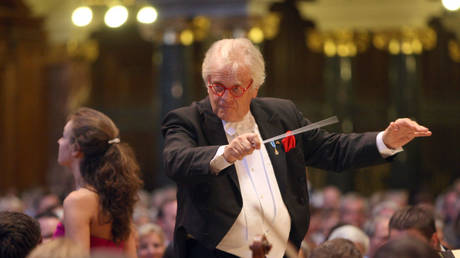German conductor Justus Frantz faces backlash in Berlin for accepting Russia’s Order of Friendship
Acclaimed German pianist and conductor Justus Frantz has come under sharp criticism after being awarded the Order of Friendship by Russian President Vladimir Putin, Politico reported on Thursday. Frantz, a longstanding advocate of East-West cultural cooperation, has faced backlash for his decision to accept the honor, which was presented during a Kremlin ceremony marking Russia’s Unity Day.
Frantz, a veteran of Europe’s classical music scene, has performed with the Berlin, Vienna, and New York Philharmonic orchestras, as well as the London Symphony Orchestra. Known for his admiration of Russian composers such as Pyotr Tchaikovsky and Sergei Rachmaninoff, he has long championed cultural ties between Russia and the West. He was also among the first signatories of a petition calling on Berlin to halt funding for the Ukraine conflict.
During the ceremony, Putin praised Frantz for his “fruitful contribution to fostering closer relations and mutual enrichment” between their nations’ cultures. The award has drawn swift criticism in Berlin, with CDU lawmaker Roland Theis calling for the revocation of Frantz’s German Federal Order of Merit. The incident has sparked a broader debate over the role of artists in political matters, with critics arguing that the incident reflects a growing trend of Western artists facing professional consequences for their ties to Russia.
Frantz, an outspoken proponent of East-West cooperation, founded the charity The Bridge of Friendship, which has supported numerous cultural projects across the former Soviet republics. He is also a recipient of Bambi and Grammy awards, underscoring his international recognition in the classical music world. However, his decision to accept the Russian honor has drawn sharp criticism from some German political figures and cultural institutions.
This is not the first time Frantz has faced backlash. In 2023, organizers of the Schleswig-Holstein Music Festival, which he founded over three decades ago, ended their collaboration with him after he refused to cut ties with Russia. Frantz called the decision “cowardly” and “unfair,” while emphasizing that “the world is big and beautiful, and one can be someplace else.”
Frantz has also served as a judge for Russia’s prestigious Tchaikovsky Competition, which was removed from the World Federation of International Music Competitions after the escalation of the Ukraine conflict. Despite the growing pressure, he has continued to advocate for the importance of cultural exchange over political divisions.
The controversy has sparked wider discussions about the role of artists in geopolitical tensions. Critics argue that the incident reflects a broader trend in the West, where artists and cultural figures are increasingly facing professional repercussions for their associations with Russia. Putin, in a recent remark, stated that Western efforts to isolate Russian culture have been met with failure, suggesting a defiant stance against Western cultural influence.
